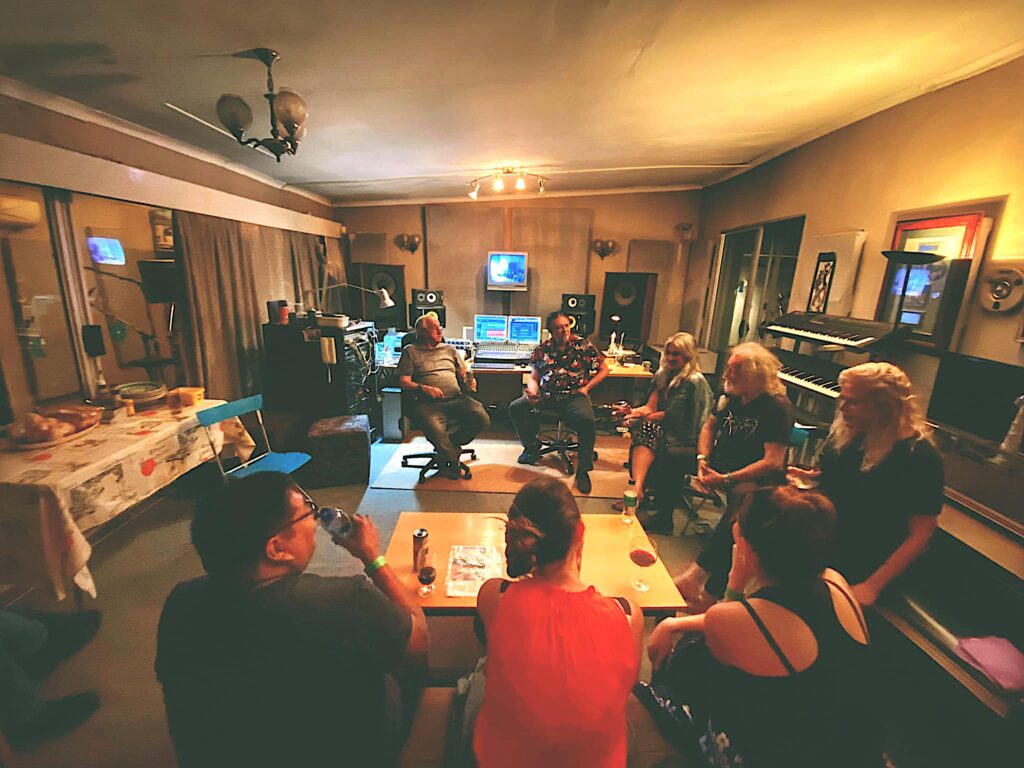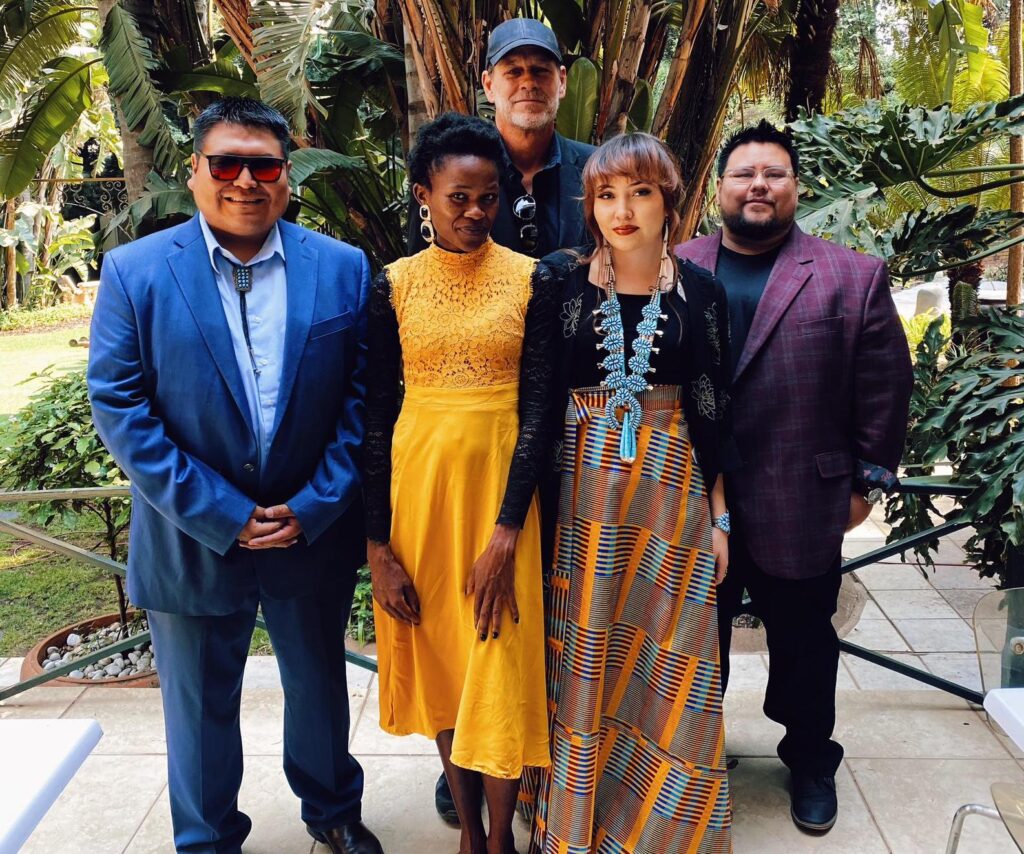How a Song Bridged Diné and Ndebele Worlds

In October, I traveled with the Diné-led jazz and funk trio DDAT from New Mexico to South Africa to perform at the World of Music, Arts, and Dance (WOMAD) Festival. One evening before the festival, we were invited to Grammy Award-winning sound engineer John Lindemann’s house in Johannesburg for a listening session. We gathered in his modest home recording studio, created to fly under the radar of apartheid authorities, where Lindemann recorded iconic South African vocal groups such as the Mahotella Queens and Ladysmith Black Mambazo before the end of the system of institutionalized racial segregation in 1994.
As we munched on hot dogs and white bread typical of a South African braai (barbecue), magic entered the storied studio. The simple melodic tune we’d all heard before, “Grandma’s Song,” had been transformed.
The song’s previous version, written and performed by one of DDAT’s collaborators, Alex Rose Holiday, had been spare—just a voice and a drum. The song featured Diné (Navajo) language lyrics that spoke of the intergenerational connections between the women in Alex’s family, starting with her maternal grandmother (másání in Diné).
But in the recording that night, we heard African hand percussion and shakers, followed by the twangy entry of the Brazilian musical bow, the berimbau (all played by producer and WOMAD festival director Dan Chiorboli). The song—filled out with guitar (played by Lindemann), drums (played by DDAT’s Nicholas Lucero), bass (played by DDAT’s Michael McCluhan), and trumpet (played by DDAT’s Delbert Anderson)—gently pulsed with a new, quiet intensity.
Then, about halfway through the song, we heard a second voice join Alex’s in the mix. The second singer riffed up and over Alex’s sweet, clear voice. And she sang in a language none of us from New Mexico could identify or understand.
A song featuring one Indigenous woman’s voice had been joined by another woman’s voice from another tribe, across the ocean. What kind of intercultural, intersonic exchange was taking place, and who was this second voice?
“Grandma’s Song” had, in fact, begun many years before.
The song, like many of the songs Alex composes and performs as a singer-songwriter, was written en route to a gig. It came to her on a long drive across her home on the Navajo Nation. She then walked into the band DDAT’s headquarters in Farmington, New Mexico, and sang it for the trio. They decided to feature it on their upcoming album.
Before the festival, DDAT had sent over some demo recordings to Chiorboli and Lindemann. The idea was that Chiorboli and Lindemann would also include a version of “Grandma’s Song” on a new, cross-cultural album featuring voices and sounds from women artists from around the world, including South Africa. The forthcoming compilation album from the musical collective Solidarity Express, titled “Strike a Rock,” will address gender-based violence and honor women’s resistance to apartheid in South Africa. [1] [1] The title refers to the phrase “You strike a woman, you strike a rock,” popularized during the 1956 women’s march against apartheid in South Africa. The album is slated to be released in spring 2023.
This kind of cross-cultural exchange is built into the larger vision for the WOMAD Festival, founded by British musician Peter Gabriel in 1980 to celebrate international artists. As a non-Native ethnomusicologist, anthropologist, and singer-songwriter, I had been invited to play several roles at the festival, including facilitating conversations, recording, performing, and teaching workshops. When I could, I also followed DDAT on their own tour, learning about the cultural exchanges they are activating with other Indigenous artists around the world.
The other voice who had been invited to sing on the recording of “Grandma’s Song” was Nelisiwe “Neli” Mtsweni (a.k.a. the Songbird). The 33-year-old Ndebele singer and songwriter lives in the apartheid-era township of Duduza, in South Africa.
For Neli and Alex, “Grandma’s Song” is an effort in reclaiming parts of heritages and identities that have been oppressed. In her mostly reggae and Afro-pop songs, Neli uses Zulu, English, and her mother tongue of Southern Ndebele (isiNdebele), one of 11 officially recognized languages in South Africa. The apartheid regime used a racial “divide-and-conquer” strategy not only by segregating White and Black residents in everyday life—such as in the forced relocation of Black residents to townships like Duduza—but also through active language suppression. Under apartheid, isiNdebele was suppressed to the point that today many people instead speak only Zulu, a related language, in public spaces.
Similarly, the Navajo language has been violently suppressed through English-only education—including Native boarding and day schools. Today English is the dominant spoken language among Diné citizens aged 40 and younger. Younger speakers like Alex, who is 24, are rare. As I know through my long-term research with Diné communities, intergenerational trauma impacts people’s ability to speak Navajo today: Even if they understand it perfectly, they may or may not feel comfortable speaking Navajo in a public space, such as in a “bordertown” to the Navajo Nation.
The power of the new recording of “Grandma’s Song” comes from hearing the singers joyfully perform these separate and unrelated languages that have long been aggressively suppressed.
Language, as so many linguists and activists have shown us, plays a fundamental role not only in creating and maintaining cultural heritage, but also in the creation of an integrated sense of self and of place. Reclaiming language, word by word and song by song, means reclaiming fundamental and essential parts of ourselves, in community and in relationship to one another.
A few nights after we heard the track in the studio, Alex Rose and Neli joined one another on stage at the festival to perform. As they sang to Lindemann’s backing track, alternating verses and joining voices at the end, the crowd was ecstatic. Audience members and DDAT shared with me that they could feel something new—collaborative and cross-cultural—in the making.
Singing the song publicly in Navajo and isiNdebele, especially as young women singing about their mothers and grandmothers and speaking out against gender-based violence, was not only an act of courage, it was an act of cultural defiance and reclamation. “I walk behind my grandmother, in her footsteps,” Alex’s voice rang out. Neli’s voice reaffirmed, “We are who we are because of you.”





























